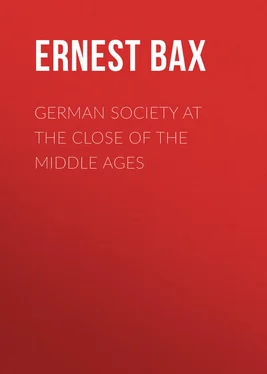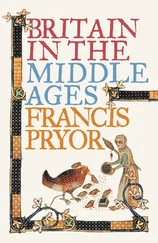Ernest Bax - German Society at the Close of the Middle Ages
Здесь есть возможность читать онлайн «Ernest Bax - German Society at the Close of the Middle Ages» — ознакомительный отрывок электронной книги совершенно бесплатно, а после прочтения отрывка купить полную версию. В некоторых случаях можно слушать аудио, скачать через торрент в формате fb2 и присутствует краткое содержание. Жанр: foreign_antique, foreign_prose, на английском языке. Описание произведения, (предисловие) а так же отзывы посетителей доступны на портале библиотеки ЛибКат.
- Название:German Society at the Close of the Middle Ages
- Автор:
- Жанр:
- Год:неизвестен
- ISBN:нет данных
- Рейтинг книги:5 / 5. Голосов: 1
-
Избранное:Добавить в избранное
- Отзывы:
-
Ваша оценка:
- 100
- 1
- 2
- 3
- 4
- 5
German Society at the Close of the Middle Ages: краткое содержание, описание и аннотация
Предлагаем к чтению аннотацию, описание, краткое содержание или предисловие (зависит от того, что написал сам автор книги «German Society at the Close of the Middle Ages»). Если вы не нашли необходимую информацию о книге — напишите в комментариях, мы постараемся отыскать её.
German Society at the Close of the Middle Ages — читать онлайн ознакомительный отрывок
Ниже представлен текст книги, разбитый по страницам. Система сохранения места последней прочитанной страницы, позволяет с удобством читать онлайн бесплатно книгу «German Society at the Close of the Middle Ages», без необходимости каждый раз заново искать на чём Вы остановились. Поставьте закладку, и сможете в любой момент перейти на страницу, на которой закончили чтение.
Интервал:
Закладка:
The barbarian nations at the time of their great migration in the fifth century were organised on a tribal and village basis. The head man was simply primus inter pares . In the course of their wanderings the successful military leader acquired powers and assumed a position that was unknown to the previous times, when war, such as it was, was merely inter-tribal and inter-clannish, and did not involve the movements of peoples and federations of tribes, and when, in consequence, the need for permanent military leaders or for the semblance of a military hierarchy had not arisen. The military leader now placed himself at the head of the older social organisation, and associated with his immediate followers on terms approaching equality. A well-known illustration of this is the incident of the vase taken from the Cathedral of Rheims, and of Chlodowig's efforts to rescue it from his independent comrades-in-arms.
The process of the development of the feudal polity of the Middle Ages is, of course, a very complicated one, owing to the various strands that go to compose it. In addition to the German tribes themselves, who moved en masse , carrying with them their tribal and village organisation, under the over-lordship of the various military leaders, were the indigenous inhabitants amongst whom they settled. The latter in the country districts, even in many of the territories within the Roman Empire, still largely retained the primitive communal organisation. The new-comers, therefore, found in the rural communities a social system already in existence into which they naturally fitted, but as an aristocratic body over against the conquered inhabitants. The latter, though not all reduced to a servile condition, nevertheless held their land from the conquering body under conditions which constituted them an order of freemen inferior to the new-comers.
To put the matter briefly, the military leaders developed into barons and princes, and in some cases the nominal centralisation culminated as in France and England in the kingly office; while, in Germany and Italy, it took the form of the revived imperial office, the spiritual over-lord of the whole of Christendom being the Pope, who had his vassals in the prince-prelates and subordinate ecclesiastical holders. In addition to the princes sprung originally from the military leaders of the migratory nations, there were their free followers, who developed ultimately into the knighthood or inferior nobility; the inhabitants of the conquered districts forming a distinct class of inferior freemen or of serfs. But the essentially personal relation with which the whole process started soon degenerated into one based on property. The most primitive form of property – land – was at the outset what was termed allodial , at least among the conquering race, from every social group having the possession, under the trusteeship of its head man, of the land on which it settled. Now, owing to the necessities of the time, owing to the need of protection, to violence and to religious motives, it passed into the hands of the over-lord, temporal or spiritual, as his possession; and the inhabitants, even in the case of populations which had not been actually conquered, became his vassals, villeins, or serfs, as the case might be. The process by means of which this was accomplished was more or less gradual; indeed, the entire extinction of communal rights, whereby the notion of private ownership is fully realised, was not universally effected even in the west of Europe till within a measurable distance of our own time. 6 6 Cf. Von Maurer's Einleitung zur Geschichte der Mark-Verfassung ; Gomme's Village Communities ; Stubbs' Constitutional History .
From the foregoing it will be understood that the oppression of the peasant, under the feudalism of the Middle Ages, and especially of the later Middle Ages, was viewed by him as an infringement of his rights. During the period of time constituting mediæval history the peasant, though he often slumbered, yet often started up to a sudden consciousness of his position. The memory of primitive communism was never quite extinguished, and the continual peasant-revolts of the Middle Ages, though immediately occasioned, probably, by some fresh invasion, by which it was sought to tear from the "common man" yet another shred of his surviving rights, always had in the background the ideal, vague though it may have been, of his ancient freedom. Such, undoubtedly, was the meaning of the Jacquerie in France, with its wild and apparently senseless vengeance; of the Wat Tyler revolt in England, with its systematic attempt to embody the vague tradition of the primitive village community in the legends of the current ecclesiastical creed; of the numerous revolts in Flanders and North Germany; of the Hussite movement in Bohemia, under Ziska; of the rebellion led by George Doza in Hungary; and, as we shall see in the body of the present work, of the social movements of Reformation Germany, in which, with the partial exception of Ket's rebellion in England a few years later, we may consider them as coming to an end.
For the movements in question were distinctly the last of their kind. The civil wars of religion in France, and the great rebellion in England against Charles the First, which also assumed a religious colouring, open a new era in popular revolts. In the latter, particularly, we have clearly before us the attempt of the new middle class of town and country, the independent citizen, and the now independent yeoman, to assert its supremacy over the old feudal estates or orders. The new conditions had swept away the revolutionary tradition of the mediæval period, whose golden age lay in the past with its communal-holding and free men with equal rights on the basis of the village organisation – rights which with every century the peasant felt more and more slipping away from him. The place of this tradition was now taken by an ideal of individual freedom, apart from any social bond, and on a basis merely political, the way for which had been prepared by that very conception of individual proprietorship on the part of the landlord, against which the older revolutionary sentiment had protested. A most powerful instrument in accommodating men's minds to this change of view, in other words, to the establishment of the new individualistic principle, was the Roman or Civil law, which, at the period dealt with in the present book, had become the basis whereon disputed points were settled in the Imperial Courts. In this respect also, though to a lesser extent, may be mentioned the Canon or Ecclesiastical law, – consisting of papal decretals on various points which were founded partially on the Roman or Civil law, – a juridical system which also fully and indeed almost exclusively recognised the individual holding of property as the basis of civil society (albeit not without a recognition of social duties on the part of the owner).
Learning was now beginning to differentiate itself from the ecclesiastical profession, and to become a definite vocation in its various branches. Crowds of students flocked to the seats of learning, and, as travelling scholars, earned a precarious living by begging or "professing" medicine, assisting the illiterate for a small fee, or working wonders, such as casting horoscopes, or performing thaumaturgic tricks. The professors of law were now the most influential members of the Imperial Council and of the various Imperial Courts. In Central Europe, as elsewhere, notably in France, the civil lawyers were always on the side of the centralising power, alike against the local jurisdictions and against the peasantry.
The effects of the conquest of Constantinople in 1453, and the consequent dispersion of the accumulated Greek learning of the Byzantine Empire, had, by the end of the fifteenth century, begun to show themselves in a notable modification of European culture. The circle of the seven sciences, the Quadrivium, and the Trivium, in other words, the mediæval system of learning, began to be antiquated. Scholastic philosophy, that is to say, the controversy of the Scotists and the Thomists, was now growing out of date. Plato was extolled at the expense of Aristotle. Greek, and even Hebrew, was eagerly sought after. Latin itself was assuming another aspect; the Renaissance Latin is classical Latin, whilst Mediæval Latin is dog-Latin. The physical universe now began to be inquired into with a perfectly fresh interest, but the inquiries were still conducted under the ægis of the old habits of thought. The universe was still a system of mysterious affinities and magical powers to the investigator of the Renaissance period, as it had been before. There was this difference, however: it was now attempted to systematise the magical theory of the universe. While the common man held a store of traditional magical beliefs respecting the natural world, the learned man deduced these beliefs from the Neo-Platonists, from the Kabbala, from Hermes Trismegistos, and from a variety of other sources, and attempted to arrange this somewhat heterogeneous mass of erudite lore into a system of organised thought.
Читать дальшеИнтервал:
Закладка:
Похожие книги на «German Society at the Close of the Middle Ages»
Представляем Вашему вниманию похожие книги на «German Society at the Close of the Middle Ages» списком для выбора. Мы отобрали схожую по названию и смыслу литературу в надежде предоставить читателям больше вариантов отыскать новые, интересные, ещё непрочитанные произведения.
Обсуждение, отзывы о книге «German Society at the Close of the Middle Ages» и просто собственные мнения читателей. Оставьте ваши комментарии, напишите, что Вы думаете о произведении, его смысле или главных героях. Укажите что конкретно понравилось, а что нет, и почему Вы так считаете.










